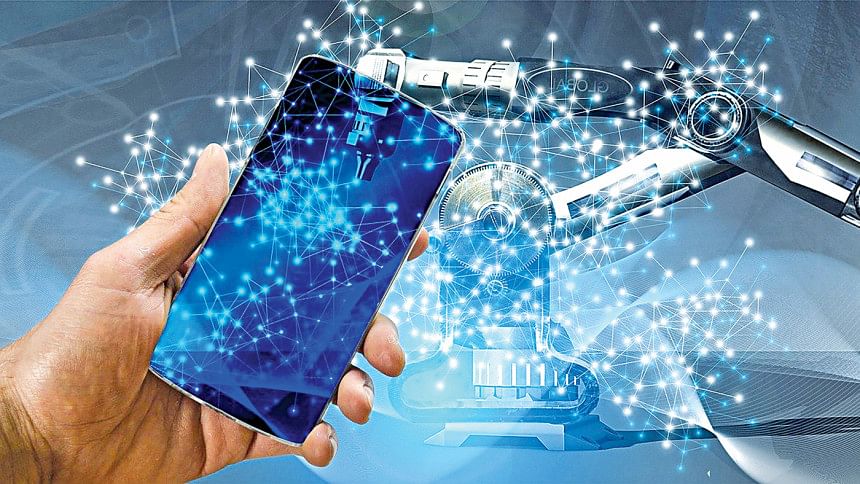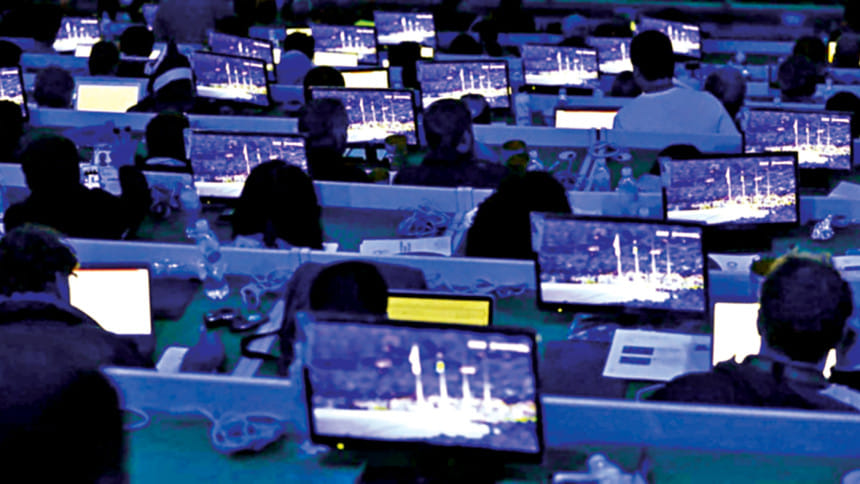The Fourth Industrial Revolution’s impact on the people of Bangladesh

Over time, history has witnessed several industrial "revolutions". The First Industrial Revolution used water and steam power to mechanise production. The Second used electric power to create mass production. The Third used electronics and information technology to automate production.
Now, the Fourth Industrial Revolution is building on the Third – the digital revolution that has been occurring since the middle of the last century. But what impact will this latest revolution have on our daily lives?
The Fourth Industrial Revolution will change not only what we do, but also who we are.
The creation of the internet and its multi-faceted uses resulted in a major shift. Tom Goodwin, Senior Vice President of Havas Media, dictates these shifts. He said, "Uber, the world's largest taxi company, owns no vehicles. Facebook, the world's most popular media owner, creates no content. Alibaba, the most valuable retailer, has no inventory. And Airbnb, the world's largest accommodation provider, owns no real estate." And for these reasons, founder of the World Economic Forum Klaus Schwab says that these changes are signs of the Fourth Industrial Revolution.
Starting from simple things such as airline check-in and train tickets to restaurant reservations and getting coffee from machines, technology has now become the service provider. Immigration clearance in advanced countries is now a matter of two to three minutes, while bank transfer takes only a few seconds. Pathao and Uber are household names now in our country. And with conventional ride-sharing apps becoming successful, there are even truck-sharing apps coming into the fray. We see fewer people and faster service. Technology is our new way of life. This will continue to unfold with further technological revolutions in the coming days.
Many online businesses have started and thrived on Facebook as well. Many entrepreneurs using the online platform could only dream about starting a business a decade ago. And there are many more examples like this but the fact of the matter is that the advent of information and technology is bringing about major changes to how people live their lives and it's affecting the lives of the Bangladeshi people as well.
Modern economies have been observing a technological revolution for more than half a century. Now, artificial intelligence, robotics, internet-of-things, block chain etc. are rapidly changing the economies, societies, and cultures. The Fourth Industrial Revolution (4IR) is changing every spectrum of human life.
The most significant impact of 4IR will be felt in the labour market. Low-skilled and repetitive work will be carried out by machines. Machines will be able to work better and faster. Of course, new types of jobs will emerge with higher productivity and higher pay. New products and services will be in demand. So, new skills and new jobs will be required. But who will get those jobs and how the labour market will cope with the technological "disruption" are important issues that should be explored.
The labour market implications of the 4IR are very important for Bangladesh, a country that has a large labour force.
This is all the more important because, despite having high growth, the economy has not been able to create enough jobs.
On the other hand, the country has not been able to benefit from the structural change in terms of employment generation. For example, the contribution of agriculture to our gross domestic product (GDP) has reduced to 13.7 percent in 2018, compared to 28.7 percent in 1990. Contrary to this, the share of the industrial sector has increased from 20.2 percent in 1991 to 32.3 percent in 2018. Similarly, the contribution of the services sector has gone up from 48.3 percent in 1991 to 50 percent in 2018.
However, employment generation does not follow the same trend. Agriculture, being the lowest contributor to GDP, creates 40.6 percent of total employment. The industries create 20.4 percent, and the services sector creates 39 percent of total jobs. Besides, more than 80 percent of employment is in the informal sector, with low and unpredictable income, without job security.
Some sectors of late are increasingly resorting to automation to increase efficiency and productivity. The export-oriented ready made garments (RMG) sector is one of them. Though the adoption of technology in the RMG sector is still slow, its impact is already visible. The share of the women labour force has declined in the sector since they are the least technologically skilled. This indicates the differential impact of technology on workers. Not everyone will experience the impact in the same manner. Not everyone will benefit from technological changes in the same way.
.

No doubt, technology has made life smooth, saved time, and improved efficiency. Technology has enabled us to be more productive and expand our economy. We can use technology for improving almost every sphere of our lives, if we use it in the right manner. We can expect to have pollution-free, cleaner and smarter cities, we can save time more efficiently and have more leisure time, just to name a few prospects.
But technology can also be a source of inequality and discrimination. During the Third Industrial Revolution, which was about information and communications technology (ICT), we observed a "digital divide". The privileged individuals with access to technology and education
could grab new jobs. They could earn a lot more than who did not have access to technology. So, if technology is in the hands of the rich and if the benefits of technology are not distributed fairly, it worsens the inequality situation.
The other issue related to technology is the quality of jobs. Our attention is more on economic growth, and less on the quality of growth. We do not know whether those working in digital platforms, such as e-commerce, have basic labour rights that guarantee minimum wage and bargaining power. Ensuring quality of jobs and maximisation of decent employment should receive more importance, as we expand the size of the digital economy.
The distributional aspects of 4IR are to be ensured through well-designed policies, such as education policy, labour policy, industrial policy, digital policy, competition policy, tax policy, etc.
In the case of education, policymakers should move beyond mere numbers, such as enrolment rates and gender parity. More focus should be on the quality of education and the opportunity for re-skilling, re-training, and re-learning. To improve the quality of education, adequate public resources should be made available. The current allocation of only 2 percent of GDP for education is inadequate to bring any positive change in the education outcome. But the tax-GDP ratio is only about 9 percent. The number of people under the tax net is much lower than that of the potential taxpayers. Tax avoidance is high as well. As a result, resources from tax collection cannot be ploughed back to sectors such as education, health, and social protection.
The distributional aspect of 4IR should be at the forefront. And the realisation of technological opportunities to everyone's benefit will hinge on appropriate policy response by the government.
There is no point in debating whether the Fourth Industrial Revolution is good or bad, or whether it will benefit Bangladesh. It's not something for us to accept, reject, or regulate. It is time that we join hands with everyone to embrace the 4IR robustly.
Farhana A Rahman is the CEO & Chairperson of UY Systems Ltd.

 For all latest news, follow The Daily Star's Google News channel.
For all latest news, follow The Daily Star's Google News channel. 



Comments